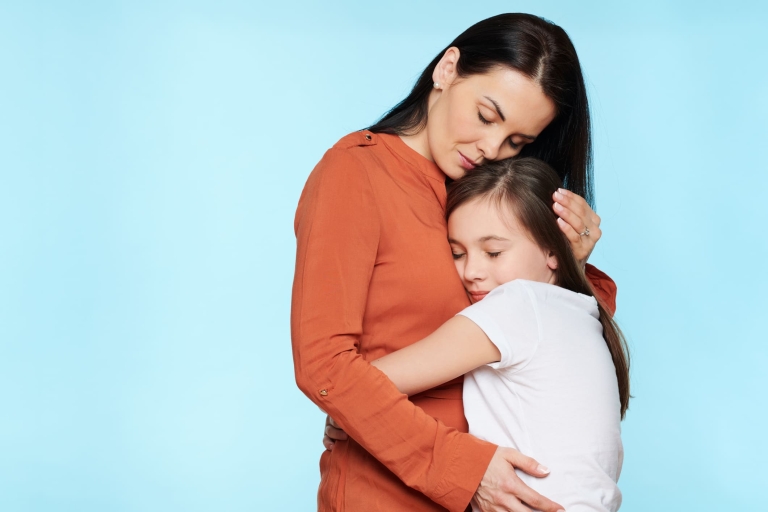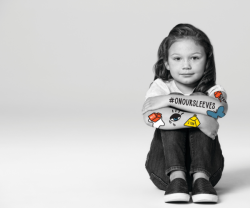10/1/24 blog post
how to sit in sadness with your kids

In this article
- My child is sad, is that normal?
- What are signs of sadness other than crying?
- How can I support my child when they’re feeling sad?
Think about the last time your child was feeling sad.
Did you immediately try to cheer them up?
"Don’t be sad, it’s such a sunny day today!"
Or maybe you tried to reason with them:
"You have so much to be grateful for, why are you sad?"
Perhaps you even joked:
"Look at Mr. Grumpy Pants being sad again!"
It’s hard to watch someone you love feel sad, and the instinct to make those feelings disappear is strong. But trying to push sadness away doesn’t actually help them. Feeling sad is a natural part of growing emotionally, and it's important for a child’s development.
As caregivers, our role is to sit with our children through tough emotions, rather than encouraging them to hide or dismiss what they're feeling.
Studies show that burying our emotions can lower our immune system while having a healthy outlet for expressing all our emotions (from happy to sad) can actually strengthen our immune system.
“It is so hard to watch our children go through tough times, but it is important that we help them learn the skills to go through hard experiences so they will be able to do so healthily as they grow into adulthood,” says Emily Weitz, children’s mental health expert.
Remember: It is okay to be uncomfortable, cry, and sit in the sadness before moving on.
Is my child feeling sad?
As adults, we can easily forget what would contribute to a child being sad. Children should be carefree, right?In reality, children can be sad despite our best efforts to meet their wants and needs. If they’re sad it’s not an indicator that you’re a bad parent. Sadness is a part of life, not a sign of weakness. They could feel sad due to:
- Poor grades
- Being rejected by peers
- Having friendship/relationship struggles
- Social media issues
- Feeling left out
- Getting into trouble
- Losing a game
If a child is sad, it may be hard to tell. Children don’t show their sadness the way many adults do and they may not always show their sadness the same way every time. Sadness looks different for each kid and signs of sadness could be:
- Tearfulness, irritability, or both
- Losing interest in activities they once enjoyed (without having outgrown them)
- Withdrawing from family, friends, or usual routines
- Changes in appetite or sleep patterns (eating or sleeping more or less than usual)
- Difficulty concentrating
- A noticeable drop in school interest or performance
- Physical complaints like headaches or stomachaches
If you notice any of these signs, you’ll want to start the conversation with them about how they’re feeling and let them know the changes you’ve noticed. Point out the signs you’ve noticed to avoid causing them to get defensive. Let them know you’re here to support and help, whatever they may be going through.
How do I talk to my child when they’re sad?
Tips for supporting your child when they are sad.
- When talking with your child about their sadness, focus on listening to understand their feelings rather than jumping in to solve their problems.
- Share personal experiences sparingly, as the goal is to keep the conversation centered on them.
- Recognize their feelings. It is important not to downplay their experience. What may seem small to you as an adult, feels so big to a child.
| try this: | instead of this: |
| "Thank you for sharing about how you are feeling." | "It’s not that bad. This is not a big deal!" |
| "You can always come talk to me when you are feeling sad." | "Is that REALLY why you are upset? There are people out there that have it much worse!" |
| "I hear you. Let me know how I can best be there for you." | "It is such a beautiful day outside! How can you be sad?" |
- After your conversation, invite them to do something with you that they enjoy to make sure they feel comforted and supported. This could be playing outside, watching a favorite movie, or playing a game.
- Remind your child that they can always come to you to talk about their emotions, no matter what. And never underestimate the power of a simple hug to show them they’re loved and safe.
When should I reach out for professional help?
Sometimes, the emotions that a child are experiencing requires the help of a licensed professional. If you've tried some of the above options and they don't seem to be working, here's how to know when you might need to seek professional help for your child.
- When you have tried the tips above and your child is still withdrawing from activities, not opening up about their feelings, and still displaying changes in sleep and appetite.
- If you child talks about having thoughts that they would be “better off dead” and sharing feelings of hopelessness.
- If your child is displaying self-injury and self-destructive behaviors
- If your child’s change in appetite and hygiene is interfering with their ability to function safely in their everyday life.
- If they are not wanting to go to school a few days a week for several weeks.
how do I get professional help for my child?
It is always helpful to have an assessment by a trained professional when your child’s emotions become a cause for concern. Sometimes, children do not share all that is going on, no matter how available you are for them.
You can get a crisis assessment by:
- Going in person to the Dayton Children’s Hospital Crisis Center (located at the main campus through the Emergency Department) during the following hours:
- Monday-Friday 8am-midnight; Saturday and Sunday 12pm-midnight
- Phone number: (937)641-4480
- Going to the Emergency Department at Dayton Children’s Hospital (both South and Main campus) which is open 24/7
- Call 988 Suicide and Crisis Lifeline
If, after having a thorough conversation with your child, you feel comfortable and assured that your child’s immediate safety is not at risk, you should make an appointment to see an outpatient therapist. For assistance with making an appointment or finding an outpatient therapist, you can reach out to the Dayton Children’s Mental Health Resource Connection three different ways:
- Access the online directory.
- Fill out this online form to receive resources emailed to you by a mental health resource specialist.
- Call the parent line (937-641-5243) to talk to a mental health resource specialist.
More resources
Feeling and showing sadness is a normal part of life, and everyone experiences it in their own way. It's important to allow that sadness to just be instead of trying to brush it aside or bury it. As a parent or caregiver, the best way to support a child through sadness is by being a compassionate listener, offering care and support, without feeling the need to "fix" everything.
If you're looking for access to even more resources to help you on your journey to supporting children's mental health, you'll want to become a part of the On Our Sleeves e-community! Our mission is to get our free, expert-created resources to as many caring adults in our communities so that everyone can understand and promote mental health for children.
Join us on this mission, by clicking the orange button below! You'll be signed up to start receiving monthly free content and resources to help you support the mental wellness of children in your life and break the stigma surrounding mental health. You'll also be the first to know about special giveaways like our Activity Book and Conversation Starter Cards!



